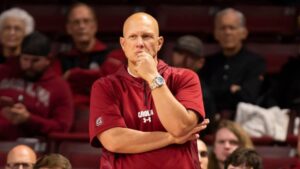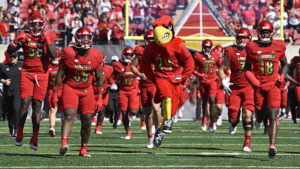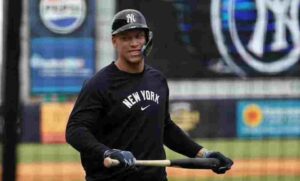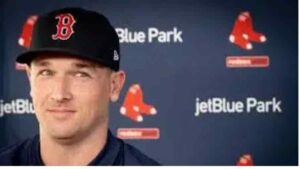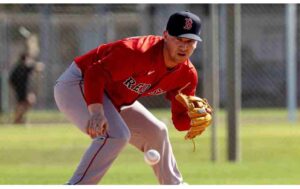
Review: Why hall of Famer Dave Parker was the best player Cincinnati Reds had in his time
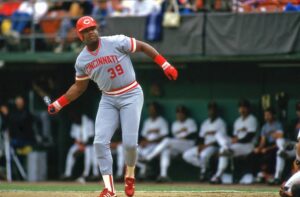
Dave Parker used to swing a sledgehammer in the on-deck circle for the Pittsburgh Pirates. He swung an even more lethal bat against National League pitching.
His right arm might have been the strongest of any outfielder in the majors during his prime in the late 1970s.
And by the time “The Cobra” became a free agent after the 1983 season, where else was he going to go?
“I was the best player they had. I did a lot of driving in runs, scoring runs,” said Parker, who rediscovered his 1978 MVP form after signing with his hometown Cincinnati Reds and spending much of the next four years playing for manager Pete Rose.
Best player they had?
Eric Davis and Barry Larkin were on those teams, too. But who’s going to tell Parker he’s wrong after the five-tool slugger with a swing as powerful as his charisma earned his long-deserved election to the Hall of Fame in Classic Baseball Era Committee voting announced Sunday night — 33 years after his last game and 13 after his final year on the baseball writers’ ballot.
“He was the best player. Oh, yeah,” said Davis Sunday night in Dallas, where he’s part of the Reds’ front office contingent at the winter meetings. “I was 21 years old when we had just gotten him from Pittsburgh in ’84, and I can remember the first time I saw him I was still in awe. I went up to introduce myself, and the first thing he said was, ‘I know who you are. Get out of the way; I’ll talk to you a little later.’
“That was his way of breaking the ice. But he took care of me. I didn’t pay for anything for two years. I didn’t buy nothing. He took me everywhere. The only thing I had to do was I had to be the first one down to the limo because he wouldn’t wait.”
Davis, who opened a new wine bar on Fourth Avenue downtown on Saturday (check out his new Eric the Red wine), said Parker had to cancel a scheduled appearance for the grand opening because he wasn’t feeling well, something Davis chalked up to anxiety over the upcoming Hall announcement.
“I cried,” Parker, 73, said of receiving the call. “It only took a few minutes because I don’t cry.”
He and Dick Allen, another seven-time All-Star with an MVP award, will be in Cooperstown, N.Y., July 27 for the induction ceremony, which also will include anyone elected on this month’s writers’ ballot.
“I’m looking forward to being there. I’ve been holding this speech in for 15 years,” he said.
Davis said he got “emotional,” too.
“Why? Because I’ve probably been his biggest advocate,” Davis said. “He changed the game. And I don’t say that because I played with him and he mentored me. Just looking at him — he changed the game, his stature in the game, his impact on the game.”
Parker, who has battled Parkinson’s disease for more than a decade, still makes his home in the Cincinnati area.
He said he talked to both Davis and Larkin, the Reds Hall of Famer from Moeller, Saturday ahead of the selection.
Both made their big-league debuts during Parker’s four years with the Reds, Davis in 1984, Larkin two years later.
“Those were my babies,” Parker said. “I took them out, bought them clothes, taught them what to do. Pete Rose once said I should be giving Dave Parker half my salary. I agreed with him.”
When Davis said Parker changed the game, he mentioned that 6-foot-5, 230-pound frame of a football player that Parker was at Courter Tech. But also his influence in the clubhouse as the heart and soul of Rose’s teams.
“He probably had more impact on young players than any player I’ve ever been around,” Davis said. “Black, white, it didn’t matter.”
And at his size, “to be able to move the way that he did with the cachet that he had — he made the game cool for Blacks,” Davis said.
“His game was swagger. He had a style and the cachet to back up his game.”
Parker won batting titles for the Pirates in 1977 and ’78, and he was the best player on the Pirates’ 1979 World Series champion.
If it looked like he was on the decline into his early 30s as he joined his hometown Reds, he surprised critics with a 1985 season that included a career-high 34 home runs, NL-leading 125 RBIs, a .312 batting average (.916 OPS) and the first of two All-Star selections as a Red. He finished second to the St. Louis Cardinals’ Willie McGee in MVP voting that year.
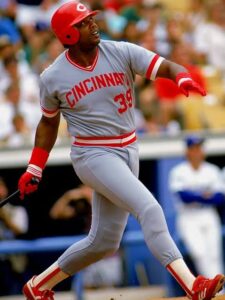
“Yeah, he was the MVP that year,” Davis said, “because he carried us. That started us finishing second four straight years. “
Parker also won the first All-Star Home Run Derby in 1985.
“I was a five-tool player. I could do it all,” said Parker, who broke from Roberto Clemente’s shadow as the Pirates right fielder during a five-year run in the late 1970s that included three gold gloves and 72 runners thrown out.
“I enjoyed throwing out players,” said the man who famously threw out two — one at the plate and one at third base — during the 1979 All-Star Game.
Parker called Hall of Fame classmate Allen, who won his MVP in the American League in 1972, a”great guy, with great leadership, great to be around.
“He used to hit bullets to right field, and I was the guy that caught most of them.”
Maybe it wasn’t surprising that Parker kept the one-liners coming through multiple media sessions Sunday night.
“He would always say, ‘When the leaves turn brown, I’ll be wearing the batting crown,’ “ Davis said. “He had so many (sayings). He was a comedian at heart.”
Even in 1976 as a young player with Willie Stargell’s Pirates, he showed up to the clubhouse one day with a T-shirt inspired by music he and teammates listened to, emblazoned with a slogan meant to inspire a briefly slumping lineup and that became an iconic part of his Pirates legacy: “If You Hear Any Noise It’s Just Me And The Boys Boppin.”
“It caught on and people liked it,” he said. “But don’t try to copyright it. Because it’s mine.”

